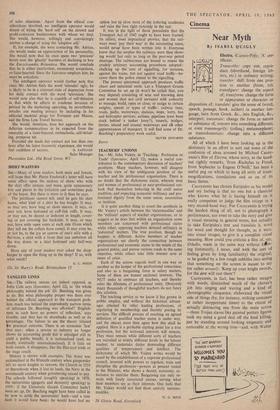TEACHERS' UNIONS
SIR,—Mr. John Vaizey, in 'Teaching: Profession or Trade' (Spectator, April 12), makes a useful con- tribution to the contemporary discussion of teachers' problems. Many teachers, however, will disagree with his view of the ambiguous position of the teacher and his professional organisation. There is no doubt that the dichotomy exists, wherein men and women of professional or near-professional out- look find themselves behaving in the craft union tradition, and expecting economic militancy and pro- fessional dignity from the same union, association or institute. It is quite another thing to assert the antithesis in Mr. Vaizey's article between the 'statesmanlike' and the `militant' aspects of teacher organisations, or to suggest as he does that within an organisation some members are concerned with professional status while other, opposing teachers demand militancy in `industrial' matters. The true position, though no happier, is different. Active members of teacher organisations see clearly the connection between professional and economic status in the minds of the general public, and pursue various roads to the same objective, while others take little interest save at times of crisis. Each of the unions regards itself in one way or another as the keeper of the professional conscience, and also as a bargaining force in salary matters. Some of them are honest sectional interests. The NUT seeks to embrace all teachers, and thereby solve the dilemma of professional unity. Obviously many thousands of thoughtful teachers do not fancy this solution. The teaching service as we know it has grown in public employ, and without the historical advant- ages attained by other leading professions, of regulating its membership and thereby pricing its services. The difficult process of reaching an agreed definition of qualified teacher status is under way, and the unions must then agree how this shall be applied. Here is a probable starting point for a true profession, but the sectional interests will remain. They must remain while different sorts of teachers are recruited at widely different levels in the labour market, to undertake duties demanding different qualities of temperament and intellect. The dichotomy of which Mr. Vaizey writes would be eased by the establishment of a supreme professional council, invested with powers to regulate, train and discipline the profession—powers at present vested in the Minister, who shows a decent, economic, re- luctance to exercise them. Bargaining can only re- main with freely associated unions, serving what their members see as their interests. One feels that Mr. Vaizey would not find them entirely unstates- manlike.


































 Previous page
Previous page